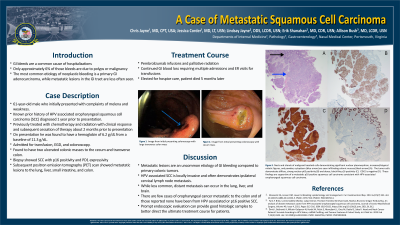Sunday Poster Session
Category: GI Bleeding
P0795 - A Case of Metastatic Squamous Cell Carcinoma
Sunday, October 27, 2024
3:30 PM - 7:00 PM ET
Location: Exhibit Hall E

Has Audio

Christopher Jayne, MD
Naval Medical Center Portsmouth
Portsmouth, VA
Presenting Author(s)
Christopher Jayne, MD, Jessica Corder, MD, LT, MC, USN, Erik Shanahan, MD, Allison Bush, MD, MPH, LCDR, MC, USN
Naval Medical Center Portsmouth, Portsmouth, VA
Introduction: Gastrointestinal (GI) bleeding is a common condition resulting in hospitalization, with approximately 6% of cases being secondary to polyps or malignancy. The most common etiology of neoplastic bleeding is a primary GI adenocarcinoma, while metastatic lesions in the GI tract are less common. We present a rare case of a patient with gastrointestinal bleeding found to have metastatic lesions in the colon from oropharyngeal squamous cell carcinoma.
Case Description/Methods: A 61-year-old man presented to the emergency department with melena. He had human papillomavirus (HPV) associated oropharyngeal squamous cell carcinoma diagnosed one year prior. No metastatic disease was identified at time of diagnosis, and he was treated with chemotherapy and radiation with clinical response and subsequent cessation of therapy 2 months prior to presentation. In the emergency department, he was found to have a hemoglobin of 6.2 g/dL from a baseline of 11.3 g/dL. He was admitted and underwent an esophagogastroduodenoscopy (EGD) and colonoscopy. Two ulcerated colon masses were identified in the cecum and transverse colon. Biopsies revealed squamous cell carcinoma (SCC) that was p16 positive and consistent with metastatic disease from his previously diagnosed HPV related SCC. Positron emittance tomography (PET) revealed numerous diffuse metastatic lesions in the lungs, liver, small intestine, and colon. Further staining showed PD-1 expressivity. The patient was started on Pembrolizumab infusions and palliative radiation therapy. The lesions continued to result in chronic GI blood loss resulting in multiple blood transfusions. Hospice services were provided, and he died five months after his diagnosis of metastatic squamous cell carcinoma to the colon.
Discussion: Metastatic lesions are an uncommon etiology of GI bleeding. There are few cases of oropharyngeal cancer metastatic to the colon and of those reported none have been from HPV associated SCC. This case highlights the importance of prompt endoscopic evaluation and considering metastatic lesions as a potential source of anemia and GI bleeding.
Disclosures:
Christopher Jayne, MD, Jessica Corder, MD, LT, MC, USN, Erik Shanahan, MD, Allison Bush, MD, MPH, LCDR, MC, USN. P0795 - A Case of Metastatic Squamous Cell Carcinoma, ACG 2024 Annual Scientific Meeting Abstracts. Philadelphia, PA: American College of Gastroenterology.
Naval Medical Center Portsmouth, Portsmouth, VA
Introduction: Gastrointestinal (GI) bleeding is a common condition resulting in hospitalization, with approximately 6% of cases being secondary to polyps or malignancy. The most common etiology of neoplastic bleeding is a primary GI adenocarcinoma, while metastatic lesions in the GI tract are less common. We present a rare case of a patient with gastrointestinal bleeding found to have metastatic lesions in the colon from oropharyngeal squamous cell carcinoma.
Case Description/Methods: A 61-year-old man presented to the emergency department with melena. He had human papillomavirus (HPV) associated oropharyngeal squamous cell carcinoma diagnosed one year prior. No metastatic disease was identified at time of diagnosis, and he was treated with chemotherapy and radiation with clinical response and subsequent cessation of therapy 2 months prior to presentation. In the emergency department, he was found to have a hemoglobin of 6.2 g/dL from a baseline of 11.3 g/dL. He was admitted and underwent an esophagogastroduodenoscopy (EGD) and colonoscopy. Two ulcerated colon masses were identified in the cecum and transverse colon. Biopsies revealed squamous cell carcinoma (SCC) that was p16 positive and consistent with metastatic disease from his previously diagnosed HPV related SCC. Positron emittance tomography (PET) revealed numerous diffuse metastatic lesions in the lungs, liver, small intestine, and colon. Further staining showed PD-1 expressivity. The patient was started on Pembrolizumab infusions and palliative radiation therapy. The lesions continued to result in chronic GI blood loss resulting in multiple blood transfusions. Hospice services were provided, and he died five months after his diagnosis of metastatic squamous cell carcinoma to the colon.
Discussion: Metastatic lesions are an uncommon etiology of GI bleeding. There are few cases of oropharyngeal cancer metastatic to the colon and of those reported none have been from HPV associated SCC. This case highlights the importance of prompt endoscopic evaluation and considering metastatic lesions as a potential source of anemia and GI bleeding.
Disclosures:
Christopher Jayne indicated no relevant financial relationships.
Jessica Corder indicated no relevant financial relationships.
Erik Shanahan indicated no relevant financial relationships.
Allison Bush indicated no relevant financial relationships.
Christopher Jayne, MD, Jessica Corder, MD, LT, MC, USN, Erik Shanahan, MD, Allison Bush, MD, MPH, LCDR, MC, USN. P0795 - A Case of Metastatic Squamous Cell Carcinoma, ACG 2024 Annual Scientific Meeting Abstracts. Philadelphia, PA: American College of Gastroenterology.

